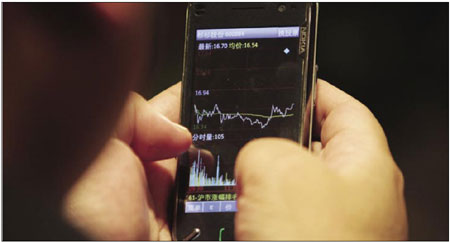Business
VCs bet on mobile Internet sector
Updated: 2011-03-01 10:59
By Lian Mo (China Daily)
|
A stock investor monitors price changes via a mobile phone. China has about 303 million mobile Web users. An Xin / for China Daily |
Beijing - Venture capitalists (VC) from home and abroad are betting on China's fledgling mobile Internet industry, even as some financial analysts point out that bubbles are forming.
Last year, a total of 22 cases of investments made by VC firms were announced in the industry. According to Zero2IPO, a Chinese firm that offers investment banking and financial advisory services, 16 of the cases totaled $207 million. The average investment sum was $12.94 million, a 291 percent increase year-on-year.
While investments flood into the industry - Zero2IPO said venture capitalists are padding their war chests for future investments - the number of mobile Web users in China continues to climb as more and more companies produce smartphones that can browse the Web, download music and play online videos. Currently there are about 303 million mobile Web users in China and the number is likely to double in the next few years.
According to AC Nielsen, a market information provider, mobile consumers in China have surpassed their American counterparts when it comes to using Web devices (38 percent of Chinese mobile subscribers to 27 percent of American mobile subscribers).
Revenue in China's mobile Internet market was 68.2 billion yuan ($10.4 billion) in 2010, a 75.8-percent increase year-on-year, according to Beijing-based research company Analysys International.
And many VC and IT firms are paying attention to the hot trend.
Shanda Interactive Entertainment Ltd, China's second largest online game company, announced plans to invest 20 million yuan to start a fund for the Android platform developers in January.
In December, three venture capital companies teamed with The 9 Ltd, a Shanghai-based game developer and operator, to launch a $100 million fund to invest in the industry.
In November, Hong Kong-listed NetDragon Websoft Inc, and IDG Capital Partners, one of the first American venture capital companies to enter the Chinese market, formed a $50 million fund to invest in small- and medium-sized startups.
Computer makers are also jumping on the investment bandwagon. Lenovo, China's largest seller of PCs, and RIM Ltd, which makes the BlackBerry smartphone, separately offered $100 million last year to invest in the industry.
"Many are holding a really high expectation of the industry but some investments are blind," said Fang Li, an analyst at Analysys International.
"The investment spree is basically in line with the prospects of the market. But if this trend continues, a bubble may emerge in two years," she said, adding that some VC firms are simply taking the chance before other competitors do.
Xue Haibo, investment manager at venture capital firm Matrix Partners China, recently spoke at a video show of QQ.com that a bubble will emerge because current investments in the industry have been too fast and too furious with many companies being overvalued.
Zhou Feng, an independent financial analyst in Shanghai, agrees with the bubble theory and takes a step further by placing some of the blame on foreign investments.
"There was a trend that many foreign VCs parked their money in China's mobile Internet sector hoping to seek good returns during the financial crisis," Zhou said.
According to Zero2IPO, 93 VC investments into the industry from 2001 to 2010 amounted to $663 million. Seventy-four of the investments used foreign currency totaling $601.96 million.
Fang said as investments flood the market, game developers in China - there are more than 300, she said - are getting squeezed by new competitors with only a few developers cutting a profit.
"Because of the good marketing work of some mobile Internet firms, many entrepreneurs believe that it will be too late if they do not enter the industry right now," she said.
One instance of a company that in a relatively short time was infused with capital is Xiaomi.com, a provider of Android applications established in April last year. Until January, it gained $35 million in venture capital with investors valuing the company at $200 million.
"Many industries experience similar pains," said Li Weidong at China Venture, a Beijing-based company that offers investment advice to companies. "They will become healthy only after investment bubbles burst - that is where the mobile Internet industry is going. Some companies will be squeezed out for sure but that is the market rule as venture capital is a business of risk."
Fang predicts revenue in the industry will reach 200 billion yuan at the end of this year because of a number of developments.
"The construction of China's third-generation telecommunication network has taken shape, the smartphone market has quickly developed and the service and products of the mobile Internet are becoming more diverse," she said.
Venture capitalists are convinced the market will bring them good fortunes.
Patrick McGovern, founder and chairman of IDG Capital, said in November that "IDG is already moving its focus on mobile Internet. There are a great number of mobile internet enterprises in China where IDG hopes to find potential targets for its investments".
IDG Capital has already made several investments in mobile Internet companies such as hiapk.com, an Android software provider.
Specials

Kremlin buddies
Dmitry Medvedev and Vladimir Putin inspect Olympic preparations.

Lantern Festival
The Lantern Festival is celebrated across China.

New York Fashion Week
Models line up before a show during New York Fashion Week.
